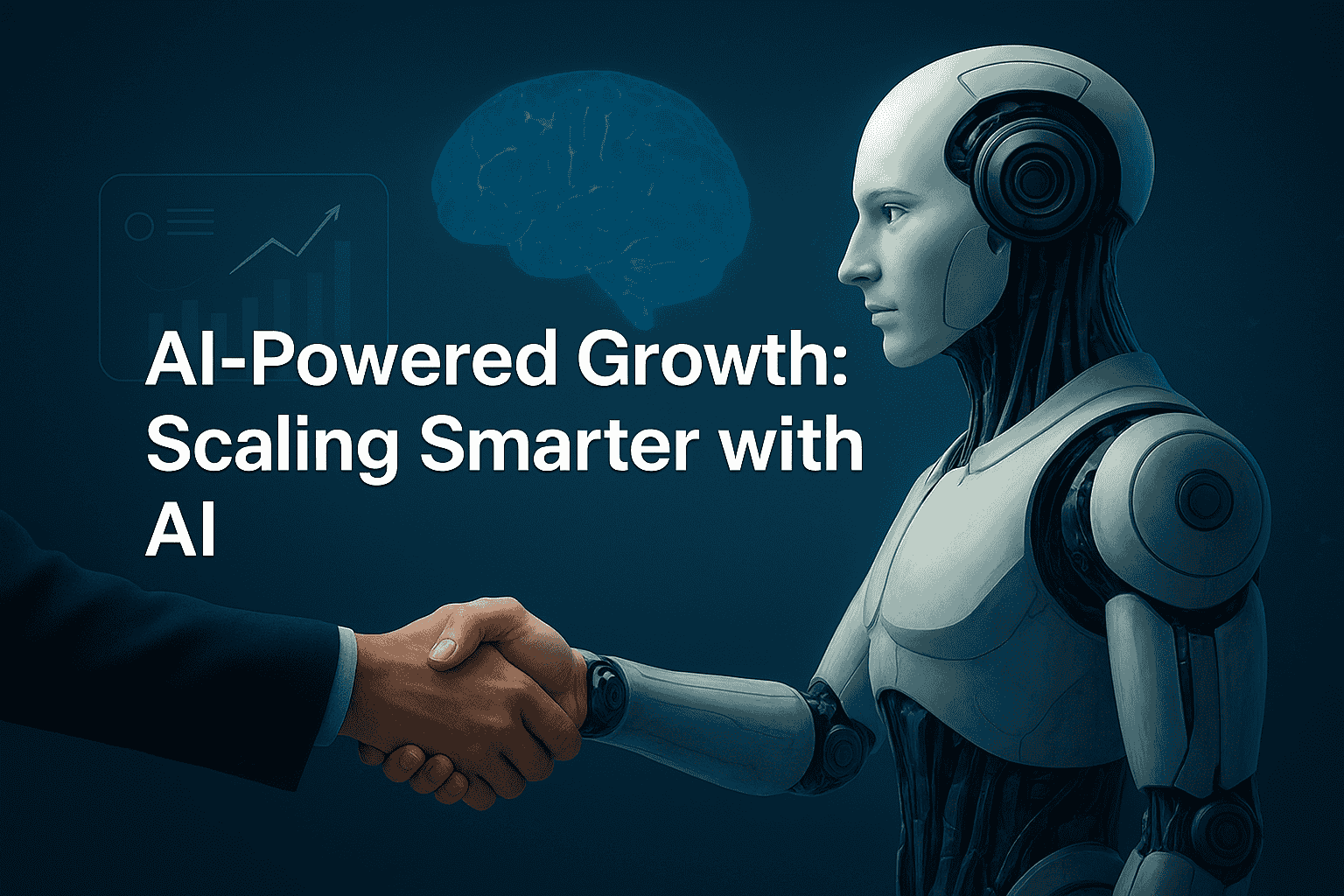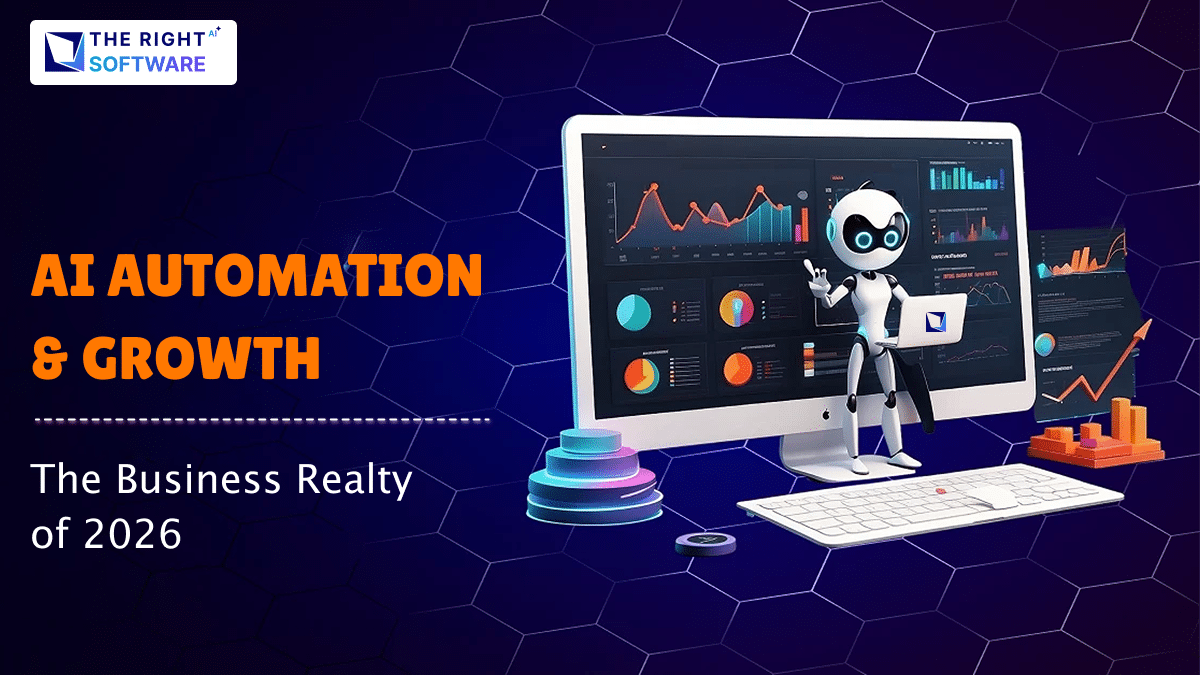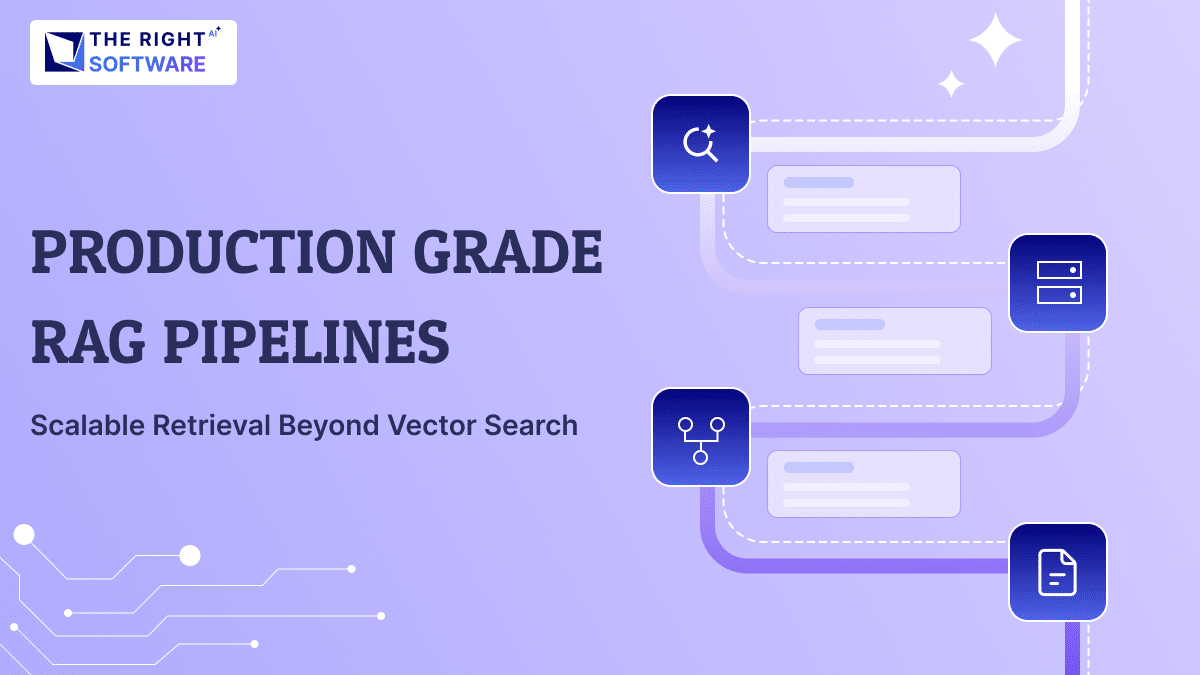Introduction: Why Scaling Smarter Matters in Today’s Business Landscape
In today’s digital-first economy, businesses are under constant pressure to scale. Scaling up usually means more customers, larger teams, and higher revenues—but also higher risks, inefficiencies, and operational complexities. While traditional growth models often focus on expanding rapidly, the smarter approach is scaling sustainably and intelligently. That’s where Artificial Intelligence (AI) comes in.
AI is no longer just a futuristic concept. It’s already reshaping industries—from finance to healthcare, retail to manufacturing—helping organizations achieve growth without unnecessary strain. Instead of running faster, AI enables businesses to run smarter, uncovering opportunities hidden in data, automating workflows, personalizing experiences, and predicting what customers or markets will need next.
At The Right Software, we’ve seen firsthand how AI can become a game-changer for companies. As a forward-thinking software house, we help businesses integrate AI into their processes to build scalable, efficient, and future-ready systems. But before we get into how companies can use AI to their advantage, let’s first understand its evolving role in modern business growth.
Understanding the Role of AI in Modern Business Growth
AI is not just about robots or self-driving cars. In business terms, AI refers to algorithms and models that mimic human intelligence—analyzing data, recognizing patterns, making predictions, and even automating decision-making.
In the past, companies relied heavily on human intuition and experience. While those qualities still matter, the scale of today’s business data is beyond human capacity. AI fills that gap, processing vast datasets in seconds, spotting patterns that humans miss, and suggesting smarter, faster actions.
This allows businesses to:
Reduce costs while improving efficiency.
Deliver personalized customer experiences at scale.
Anticipate market shifts before competitors.
Build products that adapt to customer needs.
Manage risks with more accuracy.
Simply put: AI amplifies human intelligence. It doesn’t replace people—it enables them to work on higher-value tasks while AI takes care of repetitive, complex, or data-heavy processes.
AI for Data-Driven Decision-Making
Data is often called “the new oil,” but without refinement, it’s useless. Companies generate massive volumes of structured and unstructured data—customer transactions, social media activity, operational records, website behavior, etc.
AI tools refine this data, transforming it into actionable insights. For example:
Retailers use AI to decide which products to stock and when.
Banks analyze transaction data to assess credit risks instantly.
Startups use AI dashboards to track performance metrics in real time.
Instead of decision-making based on assumptions, businesses now rely on data-driven intelligence. This reduces guesswork, improves accuracy, and helps leaders act with confidence.
Predictive Analytics for Market Trends and Customer Behavior
One of AI’s most powerful applications is predictive analytics. By analyzing historical data, AI predicts what might happen in the future—whether that’s customer buying behavior, industry trends, or economic shifts.
For example:
E-commerce platforms predict which products a user might buy next.
Hospitality companies forecast seasonal demand and optimize pricing.
Healthcare providers predict patient risks and create preventive plans.
For businesses, predictive analytics is like having a business crystal ball—helping them prepare for the future instead of just reacting to the present.
from sklearn.model_selection import train_test_split
from sklearn.tree import DecisionTreeClassifier
# Example dataset: [age, purchase history (1=Yes, 0=No)]
X = [
[25, 1],
[40, 0],
[30, 1],
[50, 0],
[22, 1],
[35, 0]
]
# Labels: 1 = likely to buy, 0 = unlikely
y = [1, 0, 1, 0, 1, 0]
# Split into training and testing sets
X_train, X_test, y_train, y_test = train_test_split(X, y, test_size=0.3, random_state=42)
# Train a Decision Tree model
model = DecisionTreeClassifier()
model.fit(X_train, y_train)
# Make a prediction for a new customer (age 28, purchase history = Yes)
prediction = model.predict([[28, 1]])
print("Prediction:", "Likely to buy" if prediction[0] == 1 else "Unlikely to buy")
This code trains a small AI model to predict customer buying behavior. Of course, in real businesses, the dataset would be much larger and models more complex, but this shows how AI can assist in data-driven decision-making.
Enhancing Customer Experience with AI-Powered Personalization
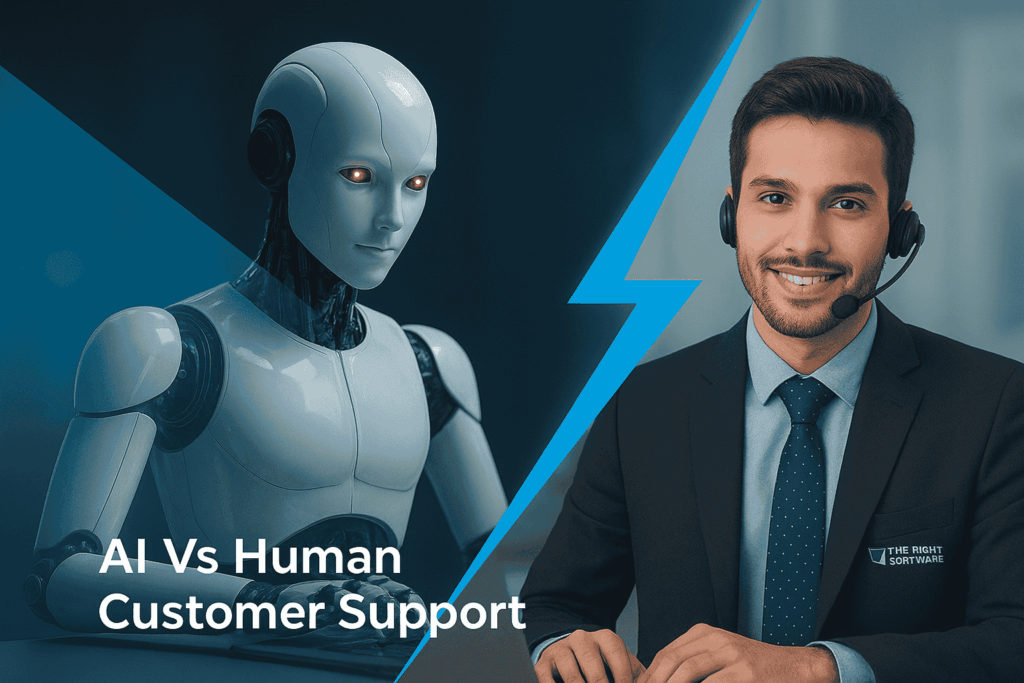
“Customers expect more than generic services”
They want brands to know them, remember them, and cater to their preferences. AI makes this possible with personalization at scale.
Examples include:
Netflix recommending movies based on your past viewing habits.
Amazon showing products “just right for you.”
Spotify curating playlists based on your mood and history.
This level of personalization builds loyalty and trust. For businesses, it translates to higher engagement, stronger retention, and better lifetime value per customer.
At The Right Software, we help companies build AI-powered recommendation engines, customer segmentation tools, and dynamic personalization systems that turn one-time buyers into repeat customers.
Intelligent Automation in Operations and Workflows
Repetitive tasks—like data entry, invoice generation, and customer queries—drain time and energy. AI-driven intelligent automation eliminates these inefficiencies. Examples:
AI chatbots answering FAQs 24/7.
Automated invoice matching and payment tracking.
AI systems monitoring supply chains in real time.
This not only saves costs but also allows employees to focus on creative, innovative, and strategic work—things AI cannot replace.
AI in Marketing: Smarter Targeting, Segmentation, and ROI Measurement
Marketing has transformed from mass advertising to hyper-personalized campaigns. AI enables marketers to:
Segment audiences with laser precision.
Optimize ad spend by predicting high-value leads.
Analyze which campaigns generate the best ROI.
For example, AI can predict which type of content resonates best with which demographic, automatically adjusting ad placements for maximum effectiveness.
This ensures that every marketing dollar is spent smartly, not just generously.
AI-Powered Sales Forecasting and Pipeline Management
Sales is all about timing and insight. With AI, companies can:
Forecast demand with high accuracy.
Score leads based on conversion probability.
Automate follow-ups and reminders.
For instance, AI can detect when a potential client is most likely to respond and nudge the sales team at the right moment. This reduces missed opportunities and boosts closing rates.
Leveraging AI Chatbots and Virtual Assistants for Customer Support
Customer expectations for support have skyrocketed—they want answers instantly. AI chatbots and virtual assistants meet this demand by providing round-the-clock support.
Benefits include:
Handling thousands of queries simultaneously.
Providing consistent, polite, and instant responses.
Escalating complex issues to human agents when needed.
This blend of AI and human support ensures customers feel heard, valued, and satis
AI in Product Development and Innovation
AI isn’t just for operations—it’s a powerful tool for innovation. Companies use AI to:
Analyze customer feedback and spot product gaps.
Run simulations and test prototypes virtually.
Generate design ideas through AI creativity tools.
For example, car manufacturers use AI to design fuel-efficient models. Software companies use AI to improve user interfaces based on behavioral analytics.
This leads to products that are more aligned with customer needs and market demands.
Supply Chain Optimization with AI Algorithms
Supply chains are the backbone of many businesses, but also one of the most complex operations. AI optimizes supply chains by:
Predicting demand fluctuations.
Tracking shipments in real time.
Reducing bottlenecks and delays.
This results in lower costs, faster delivery times, and better customer satisfaction.
AI-Driven Talent Acquisition and HR Management
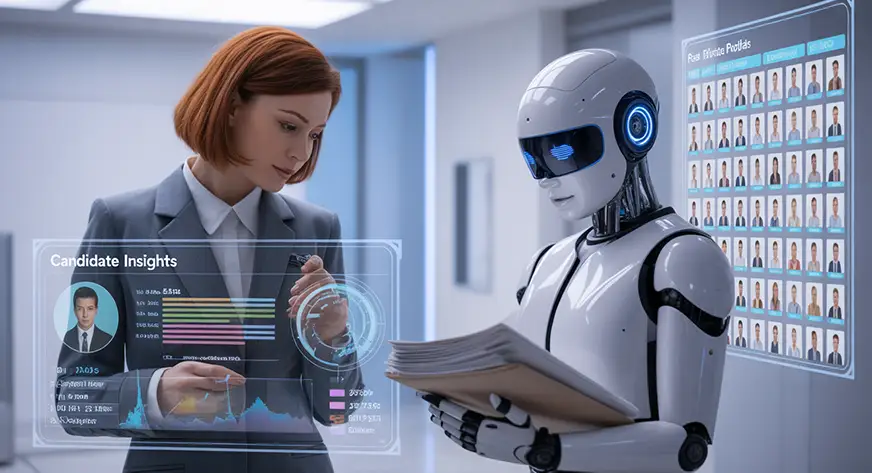
Recruitment is time-consuming, but AI streamlines it by:
Scanning resumes and ranking candidates based on job fit.
Predicting employee turnover risks.
Automating onboarding processes.
Beyond hiring, AI also helps HR teams track performance, analyze employee engagement, and design training programs tailored to individual learning styles.
At The Right Software, we’ve implemented AI-driven HR solutions that make hiring smarter and workforce management more efficient.
Risk Management and Fraud Detection with AI

AI’s ability to detect anomalies makes it ideal for risk management. Financial institutions, for example, rely on AI to flag suspicious transactions. Cybersecurity firms use AI to detect unusual network activity.
Businesses benefit by:
Reducing fraud risks.
Ensuring compliance with regulations.
Minimizing operational losses.
Overcoming Challenges: Costs, Ethics, and Data Privacy Concerns
AI adoption isn’t without challenges. Some of the key barriers include:
High initial investment in AI systems.
Ethical concerns about bias in AI decision-making.
Data privacy issues, especially with customer data.
However, these challenges can be addressed with careful planning, transparent governance, and choosing the right technology partners—like The Right Software, which ensures compliance, fairness, and ethical practices in AI deployment.
Case Studies: Companies Scaling Smarter with AI
| Industry | Company Example | AI Application | Impact |
|---|---|---|---|
| Retail Giants | Walmart, Amazon | AI for predictive restocking & demand forecasting | Reduced stockouts, optimized inventory, higher sales |
| Healthcare | Mayo Clinic, Babylon Health | AI diagnostics & predictive healthcare | Faster patient care, reduced errors, cost savings |
| Finance & Banking | JPMorgan Chase, PayPal | AI fraud detection & credit risk analysis | Saved billions in fraud losses, improved trust |
| Startups & SMEs | HubSpot, Zoho | AI-powered CRMs & marketing automation | Compete with larger players, boost customer engagement |
| Manufacturing | Siemens, GE | AI-driven predictive maintenance | Reduced downtime, increased efficiency |
| E-commerce | Shopify, eBay | AI personalization & recommendation engines | Higher conversions, improved customer loyalty |
| Logistics & Supply Chain | FedEx, DHL | AI route optimization & demand prediction | Faster deliveries, cost reduction |
| Education | Duolingo, Coursera | AI-driven adaptive learning systems | Personalized education, higher retention rates |
| Entertainment & Media | Netflix, Spotify | AI-powered content recommendation | Enhanced user engagement, reduced churn |
| Automotive | Tesla, BMW | AI in autonomous driving & smart manufacturing | Innovation leadership, safety, cost optimization |
Future Outlook: The Evolving Role of AI in Sustainable Business Growth
Looking ahead, AI will become even more integrated, intuitive, and indispensable. Businesses will no longer ask “Should we use AI?” but rather “How much of our business can AI optimize?”
Emerging areas include:
AI-powered sustainability tools to reduce carbon footprints.
AI in healthcare for personalized medicine.
AI in education for adaptive learning platforms.
AI in finance for decentralized, automated decision-making.
The companies that thrive will be those that adopt AI early, strategically, and ethically.
About The Right Software
At The Right Software (TRS), we believe that technology is the backbone of sustainable business growth. As a leading software house, we specialize in developing tailored solutions that combine innovation, scalability, and efficiency.
We don’t just build software—we build partnerships for growth. Whether it’s AI-driven solutions, custom web and mobile applications, or enterprise-level systems, our goal is to help clients scale smarter, not just faster.
With years of experience and a dedicated team of developers, designers, and strategists, The Right Software has empowered businesses across industries to embrace digital transformation with confidence.
If you’re looking to integrate AI into your business strategy or need a trusted partner for software development, we’re here to make it happen—right, every time.
Conclusion: Striking the Balance Between Speed and Intelligence in Scaling
In the race to grow, businesses often forget that faster doesn’t always mean better. Scaling without strategy can lead to inefficiencies, burnout, and wasted resources. AI changes this equation by enabling companies to scale with intelligence, precision, and sustainability.
From data-driven insights to predictive analytics, from personalized customer experiences to risk management—AI is no longer optional. It’s the foundation of modern business growth.
At The Right Software, we’re passionate about helping companies harness the power of AI—not just to grow bigger, but to grow smarter. Because in today’s competitive world, sustainable success belongs to businesses that combine speed with intelligence.


